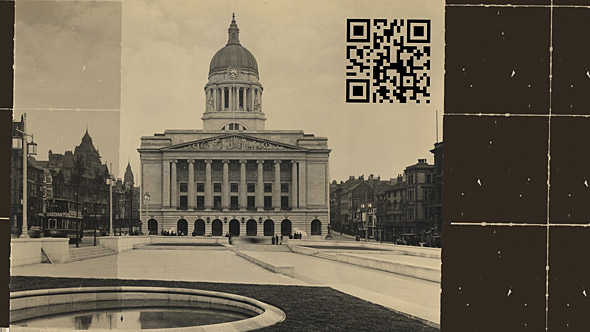
Original image by Fimb – Alan Moore, CC BY 2.0 at Wikimedia. Design James Walker.
It’s been a truly mental and surreal week, with each night worthy of a blog. But I just haven’t got time to document my life with such precision so here’s just one thing that happened and it happened on the bog. Monday night I popped over to watch the footy with Jared Wilson (LeftLion Editor-in-Chief) as I haven’t got a telly. This basically entails both of us sitting on the couch with laptops perched on our knees, occasionally looking up at the screen when the commentator sounds a bit excited – which wasn’t often. Later on that evening I was sat upstairs on the toilet when I heard this booming voice coming out of a telephone on loud speaker in the other room. It was Alan Moore who had very kindly agreed to do an interview with LeftLion. This is an amazing scoop as he very rarely gives interviews to the media but agreed to this one as he respects the LeftLion ethos e.g. we do it for free because we love it and we take the piss whenever we can.
Prior to the interview, Jared asked me to have a look at his questions. I just laughed. Having seen Moore give a spellbinding talk at the Contemporary a week ago it was clear there was little point worrying about wording because the minute you asked him a question he would go off on one. At the Contemporary he made a particularly salient point about the dangers of turning art into a commodity (Saatchi). Art, he said, is there to offer an alternative view of reality, and that it should challenge the establishment to enable things to change. When art is reduced to a commodity it dilutes in purpose and reinforces the norm. He also talked about reclaiming pornography in Lost Girls so that sexuality becomes natural and beautiful again rather than the aggressive, male-oriented perspective that reduces this communion to the clichéd world of Nuts et al.
Having heard him give these long, eloquent observations at the Contemporary I knew it would be very difficult for Jared to pin him down to the punchy responses that are required of a 1,200 word mag interview. The medium is the message after all. This is the problem with doing phone interviews over email. But there was no way you could cut Moore off in midsentence given his suspicion and contempt for the media. The role of the journalist here is to take those wonderful, lengthy provocative observations and break them down by interjecting questions in the mag piece so that the article has a natural flow and rhythm. The next issue of LeftLion will take a poke at the Olympics and it would have been great to ask Melinda Gebbie to redesign the Olympic rings in the style of Lost Girls as the shape lends itself to the curves of the human form. But we didn’t want to push our luck given Moore’s generosity in agreeing to the interview.
But back to the toilet. I knew Jared was going to speak to Moore that evening, I just didn’t realise he would start when I was in his bathroom. Joe Orton once said the toilet was the last refuge of the male, in Chapter 16 of Saturday Night and Sunday Morning, Alan Sillitoe described a corporal who found the toilet ‘marvellous’ and a place for gathering thoughts, but having inadvertently experienced this with Alan Moore booming his shamanic wisdom out in the distance, the toilet has taken on a whole new realm of meaning, an experience that will never be bettered. I suspect that the devilish Moore would find the whole episode amusing.
For info on future talks and lectures at the Nottingham Contemporary, please see their website

